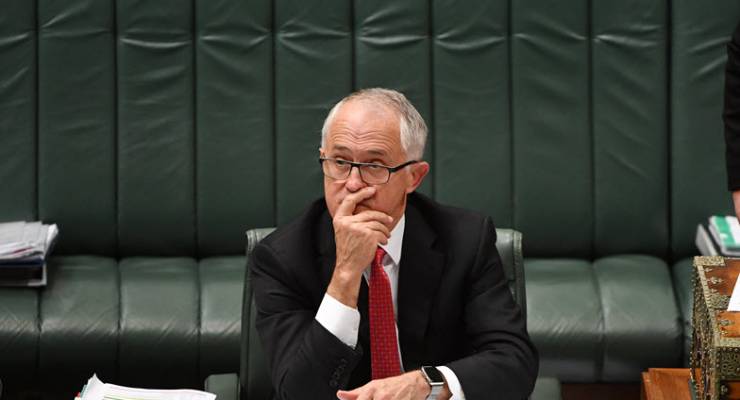
One of the successes of Malcolm Turnbull’s prime ministership has been the way he has kept the issue of climate action quiet. For an issue that represents the most significant long-term economic threat to Australia, it’s been almost entirely absent from political debate since he became a leader. He’s achieved this by dint of not actually having a policy for achieving the emissions abatement targets to which the government committed in Paris, and of pushing the issue off to a review that won’t report until the end of the year.
True, it meant Labor was able to go the 2016 election promising not one but two supposedly political toxic carbon pricing mechanisms without a glove being laid on them by the Liberals. And there was the humiliation of Josh Frydenberg last year when he rashly allowed that the climate action review might be allowed to consider a full range of policy options. But given it was an issue on which the party had ripped itself apart under his leadership before, the prime minister has played a smart political game.
But much like the cork in that festive bottle of sparkling of pointless Sydney MP Craig Kelly, the pressure couldn’t be kept contained forever. Crikey suggested last week that climate action would be the issue to make life difficult for the PM despite an improved performance since the budget. Donald Trump made that happen sooner rather than later, with far-right backbenchers now queueing up to suggest Australia abandons the Paris agreement too.
Yes, most of them are known troublemakers — Kelly, who owes his seat to Turnbull following the PM’s intervention in preselections early last year, is a serial offender against common sense; Eric Abetz, who today blogged that “Australia should similarly pull back [from the agreement] to allow for an increased focus on supporting families and jobs in Australia”, has been attacking his own government all week in estimates, including devoting an extended period sarcastically questioning the Foreign Affairs department about whether Indonesia is a moderate Muslim country. But the deputy prime minister — a long term climate denialist — also yesterday refused to endorse Australia’s continued participation.
It only remains for Tony Abbott to voice his concerns, although presumably he’s still figuring out how to justify withdrawing from an agreement Australia entered into on exactly the terms he decided when he was prime minister. But he’s an experienced hand at urging his party to do exactly the opposite of what he did as PM.
So the government has taken the unusual step of preparing us for an outbreak of internal hostilities, with Frydenberg this week warning of “big battles” within the Coalition.
The battles will be especially toxic because, like in 2009, they will be a combination of ideological issues and personality and factional differences. And Turnbull was behind in the polls then as well. But in 2009, there was no clear leadership alternative to Turnbull while he battled the denialists. That’s very different now, with both Abbott and Peter Dutton thinking they have a shot at the leadership. The test for Turnbull begins in earnest next week when the Finkel Review of energy policy is handed to COAG (don’t be surprised if there’s a leak before then, either by a state government eager to cause trouble, or from the government itself, to forestall a state government leak). If Turnbull finds a way around Coalition divisions, it will secure his prime ministership and shift the focus to Labor and Bill Shorten. If he doesn’t, it’ll be Labor popping the bubbly.








Lawyers of conscience could conduct mock trials of backsliding leaders for crimes against the commons. It would demonstrate that they can be judged, as they will be judged by an incoming generation inheriting the consequences of our neglect.
Why does it matter if Australia is in the Paris agreement or not? The gov’t will not adopt any measures which would allow us to achieve the goals required in the agreement, so our membership is just a cover story.
Sadly probably true, Robert, but not being part of the Paris agreement at all makes it a certainty. Sometimes, you have to start with a bit of paper stating aspirations. Think of the 1948 UN Declaration of Human Rights.
I’m sure many on the Federal government’s front bench will have opened the ice-cold Bolly already and watching those tiny bubbles of CO2 being released will make it that much more enjoyable for them. Craig Kelly has previously made the connection between alcoholic beverages and CO2 emissions, but methinks there is a closer connection between himself and methane emissions.
Our LNP/IPA pollies will be lining up to prove that they can out-stupid President Chump.
And you know what? Colour me biased but I reckon they’ll give it a damn good go.
Aussie, Aussie, Aussie!
So if he finds a way around Coalition divisions it will secure his job DESPITE the 13 newspolls, and counting, that hes lost ?????
I dont think so, the craven, shallow, conceited loser is toast and not before time, I cant wait to see how ashen he goes when he gets replaced by Mr Potatoe Head
Lurve the Dan Quayle VP spelling of ‘potatoe’.